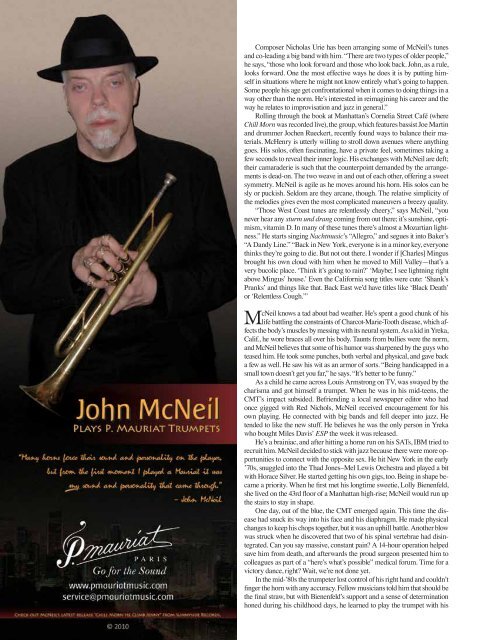Download - Downbeat
Download - Downbeat
Download - Downbeat
- No tags were found...
Create successful ePaper yourself
Turn your PDF publications into a flip-book with our unique Google optimized e-Paper software.
Composer Nicholas Urie has been arranging some of McNeil’s tunesand co-leading a big band with him. “There are two types of older people,”he says, “those who look forward and those who look back. John, as a rule,looks forward. One the most effective ways he does it is by putting himselfin situations where he might not know entirely what’s going to happen.Some people his age get confrontational when it comes to doing things in away other than the norm. He’s interested in reimagining his career and theway he relates to improvisation and jazz in general.”Rolling through the book at Manhattan’s Cornelia Street Café (whereChill Morn was recorded live), the group, which features bassist Joe Martinand drummer Jochen Rueckert, recently found ways to balance their materials.McHenry is utterly willing to stroll down avenues where anythinggoes. His solos, often fascinating, have a private feel, sometimes taking afew seconds to reveal their inner logic. His exchanges with McNeil are deft;their camaraderie is such that the counterpoint demanded by the arrangementsis dead-on. The two weave in and out of each other, offering a sweetsymmetry. McNeil is agile as he moves around his horn. His solos can besly or puckish. Seldom are they arcane, though. The relative simplicity ofthe melodies gives even the most complicated maneuvers a breezy quality.“Those West Coast tunes are relentlessly cheery,” says McNeil, “younever hear any sturm und drang coming from out there; it’s sunshine, optimism,vitamin D. In many of these tunes there’s almost a Mozartian lightness.”He starts singing Nachtmusic’s “Allegro,” and segues it into Baker’s“A Dandy Line.” “Back in New York, everyone is in a minor key, everyonethinks they’re going to die. But not out there. I wonder if [Charles] Mingusbrought his own cloud with him when he moved to Mill Valley—that’s avery bucolic place. ‘Think it’s going to rain?’ ‘Maybe; I see lightning rightabove Mingus’ house.’ Even the California song titles were cute: ‘Shank’sPranks’ and things like that. Back East we’d have titles like ‘Black Death’or ‘Relentless Cough.’”McNeil knows a tad about bad weather. He’s spent a good chunk of hislife battling the constraints of Charcot-Marie-Tooth disease, which affectsthe body’s muscles by messing with its neural system. As a kid in Yreka,Calif., he wore braces all over his body. Taunts from bullies were the norm,and McNeil believes that some of his humor was sharpened by the guys whoteased him. He took some punches, both verbal and physical, and gave backa few as well. He saw his wit as an armor of sorts. “Being handicapped in asmall town doesn’t get you far,” he says. “It’s better to be funny.”As a child he came across Louis Armstrong on TV, was swayed by thecharisma and got himself a trumpet. When he was in his mid-teens, theCMT’s impact subsided. Befriending a local newspaper editor who hadonce gigged with Red Nichols, McNeil received encouragement for hisown playing. He connected with big bands and fell deeper into jazz. Hetended to like the new stuff. He believes he was the only person in Yrekawho bought Miles Davis’ ESP the week it was released.He’s a brainiac, and after hitting a home run on his SATs, IBM tried torecruit him. McNeil decided to stick with jazz because there were more opportunitiesto connect with the opposite sex. He hit New York in the early’70s, snuggled into the Thad Jones–Mel Lewis Orchestra and played a bitwith Horace Silver. He started getting his own gigs, too. Being in shape becamea priority. When he first met his longtime sweetie, Lolly Bienenfeld,she lived on the 43rd floor of a Manhattan high-rise; McNeil would run upthe stairs to stay in shape.One day, out of the blue, the CMT emerged again. This time the diseasehad snuck its way into his face and his diaphragm. He made physicalchanges to keep his chops together, but it was an uphill battle. Another blowwas struck when he discovered that two of his spinal vertebrae had disintegrated.Can you say massive, constant pain? A 14-hour operation helpedsave him from death, and afterwards the proud surgeon presented him tocolleagues as part of a “here’s what’s possible” medical forum. Time for avictory dance, right? Wait, we’re not done yet.In the mid-’80s the trumpeter lost control of his right hand and couldn’tfinger the horn with any accuracy. Fellow musicians told him that should bethe final straw, but with Bienenfeld’s support and a sense of determinationhoned during his childhood days, he learned to play the trumpet with his36 DOWNBEAT FEBRUARY 2011
















